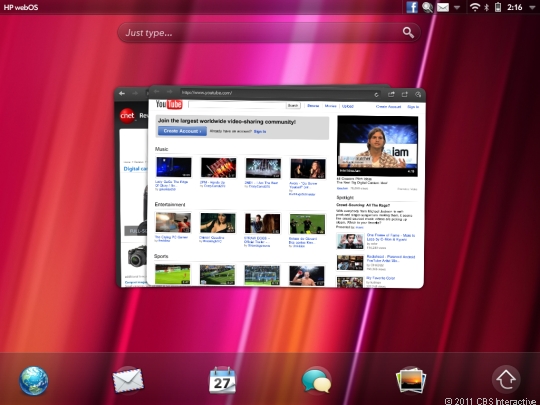HP's master plan: Put WebOS in stasis until PC unit is spun off

If you're confused about the future of HP's WebOS you're forgiven. The company's messaging isn't exactly clarifying much, but the fire sale of the Touchpad, which took on a life of its own, may yield some opportunity.
Ultimately, HP is trying to license, optimize or monetize WebOS. Those aspirations mean that HP's fire sale on the TouchPad could be a nice jump start. WebOS will have some traction---even if HP loses lots of dough on TouchPads and smartphones. If HP sticks with using WebOS on printers and PCs then there's an installed base to appeal to a potential buyer or licensee.
In other words, WebOS has enough traction to open source or potentially license. It's unclear what company would bet on WebOS, but rest assured that HP's possibly-spun-off PC unit would be a likely candidate. HP could spin off the PC business and that independent company could hop back into the tablet race. Jason Perlow also speculated that Amazon could be a fit with a WebOS tablet. That possibility isn't the worst idea out there.
Add it up and HP may have some method to its abundance of madness. However, right now there appears to be a lot more madness than method.
But by keeping WebOS somewhat alive, HP has a chance to monetize it.
Also see: Palm. HP. Who owns WebOS next?
So how's HP doing? Well, a lot more people know about WebOS than they did just a week ago. HP's bombshell announcements that it may spin off the PC unit, discontinue the TouchPad and buy Autonomy put the company front and center of the news cycle. Toss in fire sale frenzy over the weekend and HP generated more buzz for its TouchPad and WebOS than it ever could before.

HP CEO Leo Apotheker said last week on HP's earnings and transformation conference call:
We know that many developers feel the operating system is elegantly designed and is a respected platform. Therefore, we are exploring options for how best to optimize the value of webOS software going forward. However, our webOS devices have not gained enough traction in the marketplace with consumers and we see too long a ramp-up in the market share.
Due to market dynamics, significant competition, and a rapidly changing environment and this week's news only reiterates the speed and nature of this change, continuing to execute our current device approach in this market space is no longer in the best interest of HP and HP shareholders.
Therefore, we have made a difficult but necessary decision to shut down webOS hardware operations within Q4 2011. Transformation can involve difficult decisions, but we take these steps to better position for the future.
Parsing that statement, HP seems to think that WebOS can live on without hardware. The problem: HP is the only one that makes WebOS-based hardware. Talk about tricky.
Shortly after Apotheker spoke, HP said on its Palm blog that the death of WebOS was greatly exaggerated. HP didn't bury WebOS, but wanted to "ensure the platform's evolution."
No one quite bought that line.
But now it appears that the WebOS will live on via that Pre 3 smartphone---at least in France and the United Kingdom. Meanwhile, HP will use WebOS on printers and PCs, which will ultimately be spun off. Ina Fried at AllThingsD reports that HP justifies the PC-WebOS connection because the company is the only one making devices with the operating system. That's why HP will continue to churn out TouchPads in a fire sale until it empties its supply chain and component commitments.
WebOS chief Stephen DeWitt told AllThingsD that WebOS will live on in all kinds of connected devices. In other words, WebOS is not dead.
Given these somewhat crazy crosscurrents at HP, we can only guess at WebOS master plan. As a public service to HP, I pieced together parts of WebOS puzzle to hand the company a potential master plan (someone needs to have one). Here's the plan:
- Kill WebOS hardware.
- Keep WebOS software viable via PCs and printers so there's a potential ecosystem there. Perhaps you blow up the tablet market with cheap TouchPads for a month or so.
- Spin off the PC unit in 12 to 18 months. Either license WebOS or send it packing with the now independent unit. The latter is the most likely outcome.
- This independent unit would have to play in the tablet market somehow and WebOS would be revived.
- WebOS would have a base of cult followers.
- The new PC company takes on the risk of new tablets, WebOS 4.0 and makes a go of it with some help from the open source community.
- Perhaps, HP's PC spin off becomes a WebOS tablet player. Or it flops. Either way it's off HP's books going forward.
Sound convoluted? You bet. But that appears to where HP is trying to wind up. The goal: Put WebOS into stasis to buy time for the PC unit to be spun off.
Also:
- HP punts on WebOS, discontinues TouchPad, cuts outlook
- HP's TouchPad fire sale: The fallout
- HP's Recent Moves - The Strategy Issues Others Should Learn From
- CNET: Near death, WebOS is more popular than ever
- HP's future prospects: A look at three scenarios